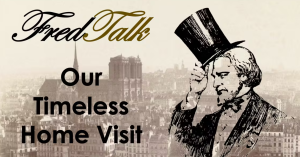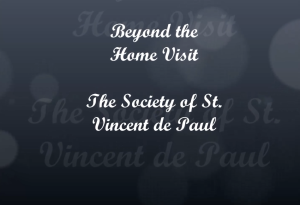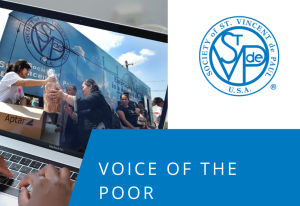
The Society of St. Vincent de Paul was formed when a group of young college students committed themselves to follow Christ’s example, declaring “Let us go to the poor!”
The Home Visit remains the central work of Members and Conferences of the Society of St Vincent de Paul. On Home Visits, Vincentians do not merely “stand with” the poor; we sit with them, we listen to them, we pray with them, and we seek to help them in the best way possible.
This commonly includes things like rental assistance, or help with utility bills or food. No work of charity is foreign to the Society. It includes any form of help that alleviates suffering or deprivation and promotes human dignity and personal integrity in all their dimensions.
Vincentians are not social workers. We serve as neighbors, seeking to understand the troubles of those we serve as we would a brother or sister, and to form relationships based on trust and friendship, and to walk with our neighbors in their time of trouble.
Home Visit Pathway
Introduction
All new members attend the Ozanam Orientation, where we are introduced to the Society’s history, spirituality, organization, and works, beginning with the heart of our vocation: the Home Visit. If you’ve never attended the Ozanam Orientation, ask your Conference leaders how you can attend. Below, you can learn about why we do home visits.
Pray and Reflect
Blessed Frédéric explained that “visiting the poor should be the means and not the end of our association.” We serve in person as Christ tells us to do, and by this, we grow closer to perfect union with Him. It is in giving, for love alone, that we receive. In order to grow more fully, we must intentionally take time to reflect, share, and pray about our encounters.
Building on the Home Visit
Since the earliest days of the Society, Conferences have created special works inspired by the knowledge they have gained, and the relationships they have formed during their home visits. In Paris, the first Conference established apprenticeship programs to train young men for jobs, for example. Today, some of these works are known by the name “Systemic Change”. The name may be new, but the idea is not. Explore some ways that we build on the home visit. In addition, the Rule calls us to be a “voice for the voiceless”. Our special perspectives come from our personal relationships with the poor, enabling us to speak from their perspectives when they cannot speak for themselves. This, too, is a tradition that dates from our earliest days, and from the example of Bl. Frédéric.
Title Download Frédéric Ozanam - Systemic Thinking and Systemic Change Link Learn about some of today’s Systemic Change programs:
Learn more about advocacy, and our Voice of the Poor program
If Not Me, Then Who?
Dr. Donna Beegle shared with the Society a seven-part video series the will give special insights into poverty realities
The password to view the videos is available in the Members Portal.
Tools for the Home Visit
The case record is just an example of a form for recording information. As the Manual explains, “Because people tend to share personal information more freely with their Vincentian visitors in the relaxed atmosphere of their own homes, Society members should be careful to record only what is essential to serve them.” Accordingly, it is very unlikely a form such as this would be filled out completely, especially on an initial visit, and your Conference will have its own guidelines.
Title Download Case Record Link It is important to reassure our neighbors that anything they tell us is kept in the strictest confidence, and that we never share it, even in order to help them, without first asking their permission. As the Manual says, “Verbal permission should suffice from persons needing help with basics such as food, utilities, rent, etc. Written permission is advisable for people who have more personal complications, such as medical or legal problems.” In case it is needed, here is a sample release form.
Title Download Sample Release Form Link Teaching the Home Visit
If you are a Servant Leader, or Formator, here are materials you can use to hold a Home Visit workshop for your Council or Conference. The primary home visit training for new members occurs at the Conference. These guidelines will help you to ensure your training covers what it needs to cover!
“At-home assistance is one of the best rendered charities and one that produces the best results, above all, in these times when help is generally dispensed with such culpable indifference; and you are aware of this, Gentlemen, now that you have all experienced it.” Bl. Frédéric Ozanam (1834)
“He who brings a loaf of bread to the home of a poor man often brings back a joyful and comforted heart. Thus, in this sweet business of charity, the expenses are low, but the returns are high.” Bl. Frédéric Ozanam (1837)
“Visiting families is not as easy as it seems; instructions in this regard are extremely useful, and it would be good to repeat them.” Bl. Frédéric Ozanam (1837)
“Let us continue to be charitable among ourselves and continue to love our brothers and sisters who are poor, because as all of you know, Gentlemen, in exchange for our love they will give us their prayers, and the blessing of the poor is a blessing from God.” Bl. Frédéric Ozanam (1834)




